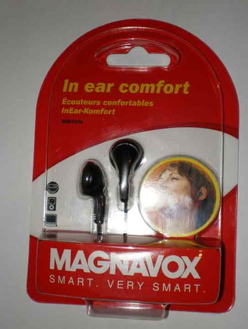
 Any of us who has ever needed a portable drill, a screwdriver and fowl shears just to get small electronics out of their seemingly impenetrable plastic shells knows that packaging has become supremely unfriendly to people and the planet.
Any of us who has ever needed a portable drill, a screwdriver and fowl shears just to get small electronics out of their seemingly impenetrable plastic shells knows that packaging has become supremely unfriendly to people and the planet.
In spite of high awareness - 73 percent of 1,200 people in the industry recently surveyed say their companies have put more emphasis on sustainability in the last year - change in the actual packaging seems slow.
That's because packaging has been all about convenience. Consumer convenience, yes - products have to look appealing and have shelf life - but mostly convenience for producers, shippers, and retailers.
 Those nasty "blister" packages that have a tiny pair of earbuds shrouded in hard plastic are convenient - they protect while shipping, hang conveniently on shelf pegs, and deter thieves.
Those nasty "blister" packages that have a tiny pair of earbuds shrouded in hard plastic are convenient - they protect while shipping, hang conveniently on shelf pegs, and deter thieves.
And the billions of plastic bags Wal-Mart still gives for free when they could now sell you a branded, recycled PET reusable bag for a buck? Well, reusable bags are horribly inconvenient for Wal-Mart checkers (many can't hang on the plastic bag carousel). It's much faster and more convenient to pack two items in plastic and whirl that carousel around, whirling you, the customer, quickly out the door.
But the masses of packaging we've all gotten used to just isn't convenient for the masses any more. As soon as you start to really recycle it's clear that what is intractable in your personal waste stream is the mounds of plastic that much of your consumables and your more durable goods come in. Quite apart from the fact that the packaging isn't convenient for us to get home and get opened, it's a big pain to get rid of.
It seems like we need a return to the corner general store concept, where the stuff we wanted was on shelves, instead of swathed in boxes and plastic clamshells, and/or we need a packaging revolution.
Some of us thought that revolution would already be upon us by now. In Europe and elsewhere the idea that a producer should be responsible for waste made by making a product has been around for over a decade. But it seems like we as consumers are just starting to wake up to the realization that all this fancy packaging is really extremely inconvenient.

How different would it be if retailers had to blister their own thumbs opening those blister packs for us? If they had to take all that plastic and extra cardboard back right at point of sale? If the UPS man had to stand at your door while you wrestled the book out of the TV-sized box so you could hand the box and all the stuffing back over? You can bet it wouldn't be too convenient for them.
The concept of taking it back is well-known and has a name - individual producer responsibility (IPR) or extended producer responsibility (EPR). In Vancouver, BC, for example, there's a movement to establish an EPR system which would make producers pay for the costs of recycling wasteful packaging. California's Integrated Waste Management Board adopted an EPR "framework" earlier this year.
In the same way that electronics companies offer on-site retail recycling for their products, perhaps all producers should be coaxed into offering on-site recycling for their easy-open, earth-friendly packaging. Even better, how about putting only display items in the prettiest packages while the real deal gets just biodegradable shrink wrap?
Not only should we be able to say "No bag, thanks" as we hand over our reusable bag. We should also be able to start saying "Take it back, please" as we hand back the packaging that we currently must lug home, rip apart and then get rid of. Of course it may mean you have to take your battery-operated Dremel to the store with you. But how highly satisfying (and convenient) to not have to lug the extra packaging back out to the curb or the recycling center.
More from TreeHugger on Packaging
A Year Of Trash Is...96 Cubic Feet Of Packaging
One Family, One Month, 50kg Of Packaging. Why? - The Observer Magazine Investigates.
Is This Too Much Packaging, You Think?
"Waste of Packaging Contest:" Time To Vote
Report: There's A Forest In Your Packaging
More from Graham Hill on Huffington Post
::Saving The Planet? Or Keeping It Livable
::Eating Local or Not: It Depends
::Tap Has 1/100 Impact of Bottled Water
::Do Big Homes Mean Bigger Happiness?
::Why I Don't Flush
::Would You Kill What You Eat?
::Europeans Happier than Americans yet Half the Footprint
::Phones as Fashion: Can You Resist the New Apple iPhone?